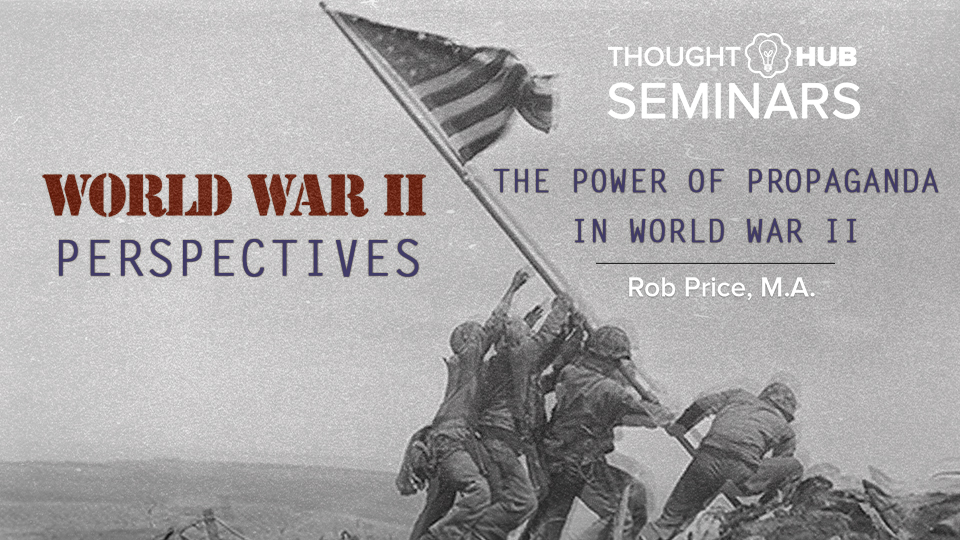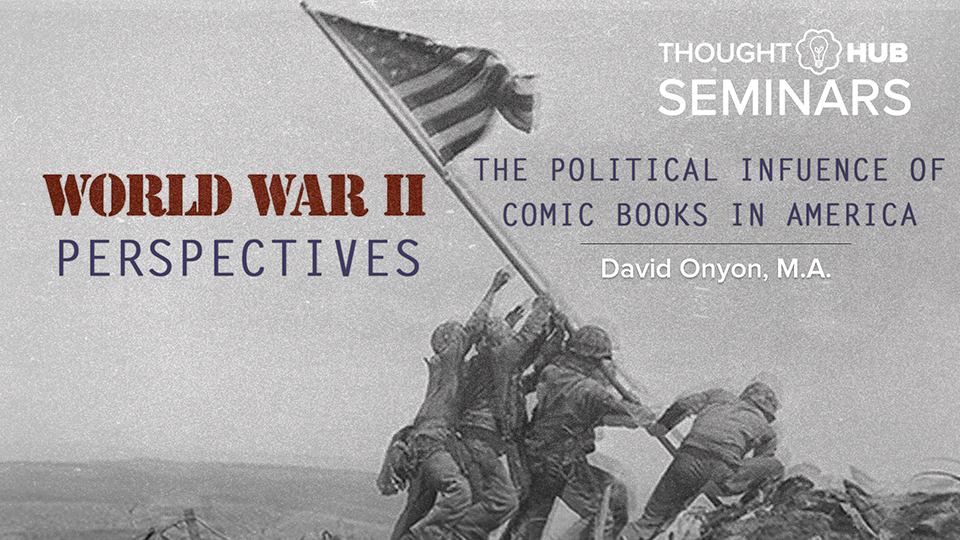Learn More About Literature
The Power of Propaganda in World War II
Published: August 29th, 2018
In a world before social media and the internet, how did the United States encourage and promote American citizens in the 1930s and 1940s to contribute to the war effort? The answer-propaganda and lots of it. While propaganda took many forms, perhaps its strongest and the most effective channel was Hollywood films. In this Thought Hub vlog, Rob Price, M.F.A., shares the impact of these films in America during this era and how many young filmmakers put their careers on hold to contribute to the war effort.
The Political Influence of Comics in America During WWII
Published: August 14th, 2018
Did you know that comic books were used as propaganda during World War II? While adults were targeted through posters and short films that were shown before movies, American children were targeted through some of our most prominent superheroes to date such as Captain America, Superman, Batman and several others. These superheroes embodied the ideal virtues of American soldiers and demonstrated the courage and resolve needed to fight evil during World War II. In this vlog, David Onyon, SAGU History Professor, discusses how the effort to win WWII went hand-in-hand with comics.
The Conceit of the Shepherd
Published: March 9th, 2017
The Bible reflects the importance of sheep in biblical society. The relationship between the sheep and the shepherd was one of intimate knowledge – the shepherd’s duty to watch over and care for each sheep was directly tied to the success of the owner.
Other Languages in Middle Earth
Published: February 2nd, 2017
Not all of Tolkien’s languages were as fully developed as Sindarin and Quenya. One language’s lack of development is explained through another real-world language attribute – sociolinguistics. The dwarves of Middle-Earth had one language, made for them by the Valar Aulë. This language is Khuzdûl. Tolkien’s dwarves were a rather xenophobic race. As such, they preferred to learn the languages of others rather than teach their language to anyone. Thus, the dwarves spoke Sindarin and Westron whenever they were among the other races and kept their own language secret. This cultural attribute of the dwarves directly affected their language and how much of the language that Tolkien actually had to develop. An example of the dwarves’ multilingualism can be seen in the Sindarin, not Khuzdûl inscription over Moria’s gate.
Earth Legends in the Middle-Earth Legendarium
Published: December 15th, 2016
Not only did Tolkien weave real-world words and sounds into his constructed languages, but he also wove real-world legends into his languages and tales. These tales often initially wound their way into the story through the use of a name as seen in his previous quote: “To me a name comes first, and the story follows.” Several names did not originate in the languages and cultures that he invented, but instead came from his reading of old literature as a philologist and academic. One of these names, possibly one of the first to influence his legendarium was Eärendil. Tolkien found this name in the Old English poem Crist. He was fascinated by these two lines:
“éala éarendel
engla
beorhtast
/
ofer
middangeard
monnum
sended
”
(Hail, Eárendil, brightest of angels/over middle-earth sent to men).
Can You Judge a Church by Its Size?
Published: August 19th, 2019
Today, there seem to be more and more articles and books either defending or castigating local churches on the issue of their size. Some applaud the large church in such a way that the smaller church seems unnecessary and without a future, while others defend the merits of the small church and treat the larger congregation with contempt and suspicion. It seems we are determined to find a side to fight for somewhere between the house churches of Acts 2 and the massive modern churches in Southeast Asia.
Is this a fight worth fighting? Is there a “right” size for local congregations or is one better than the other? In this blog, Dr. Mike Clarensau expounds on the matter.
Book Review: The Power of the Gospel However Dark the Times
Published: March 22nd, 2016
Renaissance: The Power of the Gospel However Dark the Times by Os Guinness is an instant classic that captures Western culture in a way that only Os Guinness is equipped to do. Guinness uses his prophetic voice to alert the Church to its worldly and compromised trajectory. What makes Guinness unique as a social critic is his gospel-centered optimism that fuels his strategy for turning the ship around. Renaissance is a plea to Christians to pledge their service and hope toward kindling a modern renaissance in the face of a collapsing, dark world.






